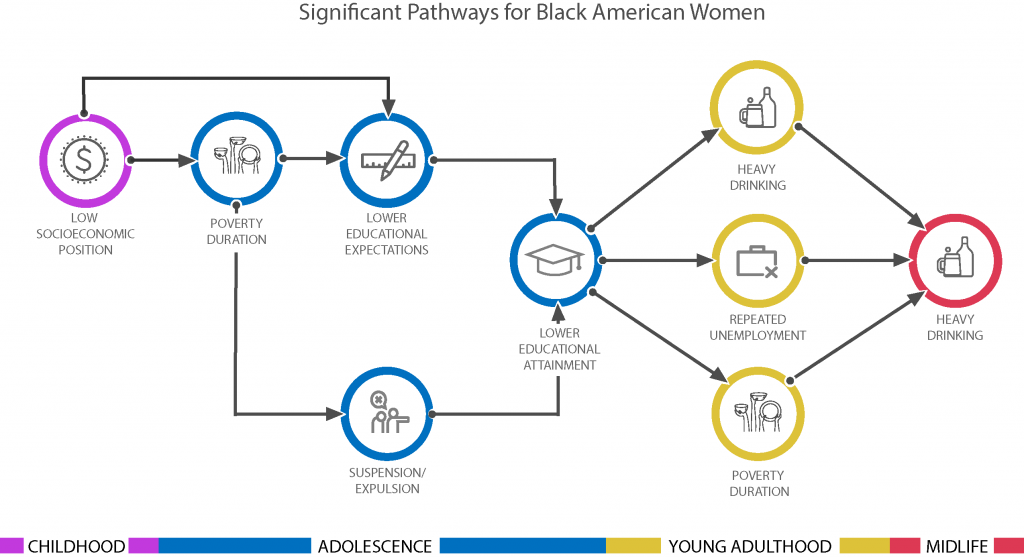Press Release
EMERYVILLE, CA — A new longitudinal study examining how educational and socioeconomic experiences during adolescence can lead to midlife (ages 42-52) heavy drinking among Black Americans has found significant pathways connecting the two. Led by researchers at the Alcohol Research Group (ARG), a program of the Public Health Institute and released in Addiction, the study examined data on individuals followed more than 30 years and included analyses of adolescent poverty and adverse academic experiences, such as attending a high-poverty or unsafe school, and being suspended or expelled.
Using data from the US National Longitudinal Survey of Youth 1979 Cohort and collected from 1299 Black respondents, the researchers found several significant associations. For both females and males, adolescent poverty duration, academic problems, and suspension were related to both lower educational expectations and, directly or indirectly, lower educational attainment. Lower educational attainment was associated with subsequent economic hardships and greater heavy drinking during young adulthood. Midlife heavy drinking was associated with young adult heavy drinking and, for women, economic hardships in adulthood.
In sex-specific analyses, pathways to heavy drinking in midlife differed for females and males. For Black women, one pathway showed low socioeconomic position in childhood led to poverty in adolescence, lower educational expectations, and lower educational attainment. Lower educational attainment then led to repeated unemployment and greater poverty duration in adulthood, which were associated with subsequent heavy drinking in midlife.

For Black men, adverse socioeconomic position in childhood led to lower educational expectations, higher rates of suspension, and lower educational attainment, resulting in higher rates of heavy drinking in young adulthood that continued into midlife.

“For Black Americans who are at a greater risk for alcohol-related problems and generally poorer health in adulthood compared to White Americans, we need to understand how social determinants earlier in life can impact adult health. This can help to inform how we address racial and ethnic health disparities,” said Nina Mulia, a senior scientist at ARG and lead author of the study. “In connecting midlife heavy drinking back to educational attainment and earlier life experiences, we are able to see the intergenerational effect that a parent’s situation has on their child’s adult outcomes, partly through experiences of poverty, school suspension, and educational expectations.”
The researchers suggest that these experiences, once identified, can be intervention points for disrupting pathways to negative adult outcomes. For instance, replacing exclusionary school discipline practices such as suspension and expulsion, which are disproportionately applied to Black students, could improve educational attainment and lower the risk of midlife heavy drinking.
“Social policies to reduce childhood and adolescent poverty and programs to elevate educational expectations and academic performance, could help increase educational attainment for Black Americans,” Mulia added. “If successful, this could result in a variety of social and health benefits that are not just limited to reductions in harmful drinking in adulthood.”
The study “Education Matters: Longitudinal Pathways to Midlife Heavy Drinking in a National Cohort of Black Americans” by Nina Mulia, Jane Witbrodt, Katherine J. Karriker-Jaffe, Libo Li, Camillia K. Lui and Tamika Zapolski is available at: https://onlinelibrary.wiley.com/doi/abs/10.1111/add.15882.
__
Support for this paper was provided by the National Institute on Alcohol Abuse and Alcoholism (NIAAA) under award numbers R01AA022668 and R01AA026956, (N. Mulia, PI), and the National Institute on Drug Abuse under award number K01DA043654 (T. Zapolski, PI), at the National Institutes of Health. The content is solely the responsibility of the authors and does not necessarily represent the official views of the National Institutes of Health.





